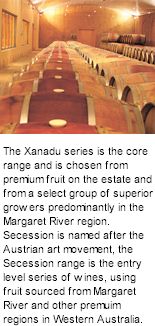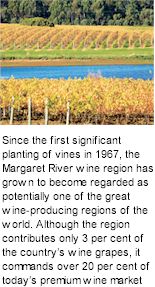


Xanadu was established by Dr John Lagan, an Irishman, who arrived in Margaret River in 1968 and was inspired by the pioneering spirit of the region. At the time, the potential of Margaret River as one of the world’s finest wine-producing regions was only just being considered. John established one of the region’s earlier vineyards planting his first vines in 1977. A lover of literature and inspired by the similarities between the environment at Xanadu and words of Coleridge; Dr Lagan named the vineyard after the home of Kubla Khan.

In an idyllic setting in the very South West corner of Australia, the 85 hectares of vines on the original Xanadu Wine Estate flourish in the rich, free draining gravel soils of the Margaret River region. In this near-perfect environment for viticulture, this unique maritime climate enjoys an abundant supply of water and is sheltered by forests of magnificent marri trees. A state-of-the-art winery / restaurant and cellar door has been constructed, with the extensive use of local granite and gneissic rocks, excavated during the planting of the original vineyard. These low yielding, carefully handled vines produce a range of varieties under the labels Secession, Xanadu and Lagan Reserve.
Enjoying a strong family focus since its inception almost 30 years ago, the company was listed on the ASX in April 2001. More recently, Xanadu Wines has returned to family ownership having been purchased by the Rathbone Family in August 2005. The Rathbone family remain focused on producing premium wines that reflect the true characteristics of the Margaret River region.
On the rolling slopes of Xanadu’s vineyard, vines flourish in the rich, free draining gravel soils of the Margaret River region, where they are fed by an abundant supply of pristine water, and sheltered by forests of magnificent marri trees. It's a near perfect environment for viticulture.

The ocean strongly defines the climate in Margaret River, which is classed as 'west coast Mediterranean' featuring warm to hot summers and mild to wet winters. The majority of Margaret River's approximate 1100mm of rain falls between April and October, and with an average rainfall of around 50mm from December to February. This usually means a dry ripening and harvesting season, come vintage time in March and April. The summer daytime temperatures are usually kept below 32 degrees Celsius, while daytime winter temperatures can vary from around 11 degrees to around 18 degrees Celsius. The extreme temperatures, humidity and frosts are kept at bay by the influence of the Leeuwin current of the near by Indian Ocean.
The vineyards of Xanadu are situated on the Leeuwin-Naturaliste Ridge formed from an ancient granite landmass 2000 million years old. The soils are mostly formed in situ as a result of long periods of weathering. Granite decomposes to form iron-rich clay, which precipitates to the surface forming laterite gravel loams, the best vine growing soils in the region.
From the time the first vine was planted by the Lagan family 1977 through to today the focus has been on a holistic approach towards grape growing. The 85 hectares of vineyard continues to produce wines of excellent yet constantly improving quality. The Cabernet Reserve, Semillon, Chardonnay, Shiraz and Merlot being the most noted wines.
